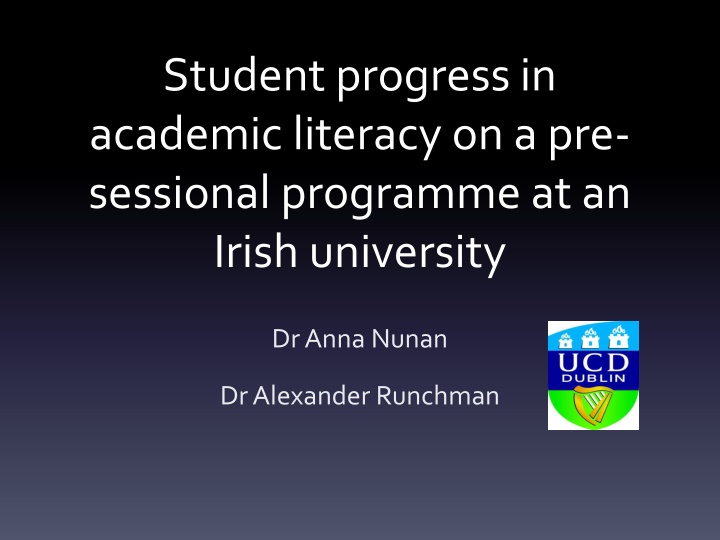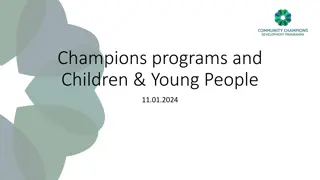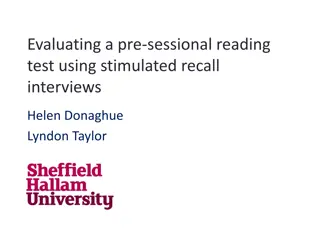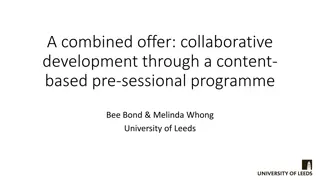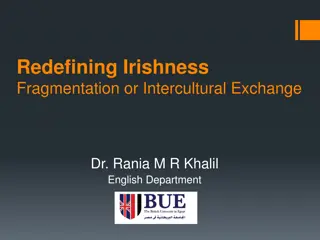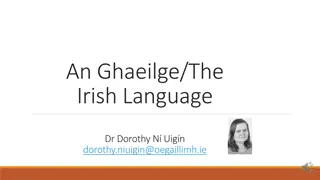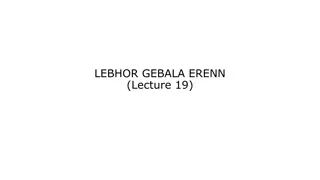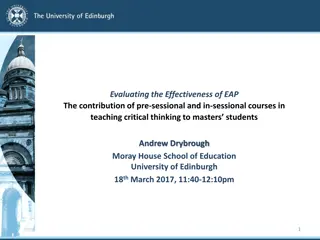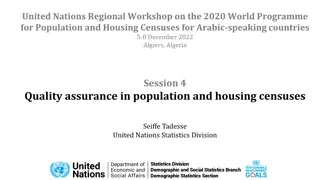Insights into Student Progress on Pre-Sessional Programmes at Irish Universities
Research on pre-sessional programmes at Irish universities highlights aspects such as assessing students, academic content and methods, dealing with assignments, and scaffolding academic writing. The student perspective in such programmes, including their involvement, challenges, and progress, is crucial but often under-researched. Student perceptions of their English ability play a significant role in measuring achievement, and understanding their perspectives is essential for program effectiveness and student success.
Download Presentation

Please find below an Image/Link to download the presentation.
The content on the website is provided AS IS for your information and personal use only. It may not be sold, licensed, or shared on other websites without obtaining consent from the author.If you encounter any issues during the download, it is possible that the publisher has removed the file from their server.
You are allowed to download the files provided on this website for personal or commercial use, subject to the condition that they are used lawfully. All files are the property of their respective owners.
The content on the website is provided AS IS for your information and personal use only. It may not be sold, licensed, or shared on other websites without obtaining consent from the author.
E N D
Presentation Transcript
Student progress in academic literacy on a pre- sessional programmeat an Irish university DrAnna Nunan DrAlexander Runchman
2 parts Student perspective and involvement Student progress and challenges
Research on pre-sessional programmesfocuses on Assessing students on pre-sessional programmes (Banerjee, 2006) Content and methods on pre-sessional programmes (Lynch, 2014) Dealing with outside assistance on assignments (Westbrook, 2015) Scaffolding academic writing (Seviour, 2015)
The student perspective is under- researched The student at the centreof the programme
Research on student perspectives Many students come onto PSPs with an idealistic view of the place they will establish in society (Jarvis, 2010) Students using English outside the classroom has been shown to be a key factor in student satisfaction with their study abroad experience it may be possible to develop socio-cultural competence in order to support students in taking a more active role in their interactions (Copland, 2011)
Perception of English ability Students perceptions of their English ability are more important in measuring achievement than scores in IELTS or TOEFL (Xu, 1991) The psychological feeling of incompetence is more debilitating than actual language ability (Chang, 2010)
Why study the student perspective? It is difficult to make progress if students are not aware of what to expect on a programme Progress is difficult if students are not sufficiently involved in the programme
This research focused on Student expectations of a pre-sessional programme Students prior English language learning experiences Student perspectives on a pre-sessional developed for them
Methodology 20 students were interviewed on arrival and at the end of the 10-week programme Questions related to reasons for doing a PSP, prior ELL, future English language use, etc. Qualitative analysis involveda conceptually clustered matrix approach
Findings Students do not have a clear sense of what a pre-sessional entails
A series of mismatches My agent recommended it I did not have good enough IELTS scores for direct entry I studied Law in China but got into Media Studies here
Finding 2 Students are aware of the shortcomings of prior ELL (You, 2004)
English classes There were too many students It was boring I have to remember a lot of words Students just want to pass the exams
Finding 3 Students were very interested in the research approach to this study
Interest in research I want to learn foreigner s thought on research We can use academic language for our research projects At home we didn t do our own research
Holistic approach It is important to look at the students inthe programme This involves their past, present and future
SLL as participation and the (re)construction of selves SLL is a struggle of concrete socially constituted and always situated beings to participate in the symbolically mediated lifeworldof another culture (Lantolf, 2001)
Participation is important A participation metaphor for SLL obliges us to think of SLL as a process of becoming a member of a community (Pavlenko, 2000)
Imagined communities Membership in imagined communities affects learning trajectories (Pavlenko, 2007) Identity theorists question the view that learners can be defined in binary terms as motivated or unmotivated, introverted or extroverted (Norton, 2013) A learner can be highly motivated to learn a language, but not necessarily invested in a set of practices (Norton, 2013)
Involve the student Becoming part of an academic community
Academic community Student involvement, negotiated syllabus, research projects, disciplinary focus
Part 2: Student Progress and Challenges Listening
Student progress following a pre-sessional programme students, irrespective of subject studied, who undertake a top-up course in English do notably poorer than students who arrive with either an acceptable IELTS score for their programme of study, or with other appropriate English language qualifications. (Thorpe et al, 2017)
This suggests one of two things. Either the top-up courses undertaken do not bring the student up to the expected IELTS entry score, and/or that these students are in some way inherently weaker academically in any case and this contributed to their low IELTS score in the first place. (Thorpe et al, 2017)
Comparison of Writing, Extended Writing, and Listening Grades 30 25 20 15 10 5 0 A+ A A- B+ B B- C+ C C- D+ D D- E+ E E- F+ Writing Extended Writing Listening
Two inferences can be drawn from this: 1) Students had not anticipated the demands of academic listening. Many of them were not able to adapt to these demands within the constraints a 5- or 10- week pre-sessional programme. 2) The construct validity of our assessment may need reconsideration. Is our assessment a fair reflection of students capability? What should be tested on a pre-sessional programme in terms of listening?
Pre-sessional exit test scores for students with IELTS Listening Score 5.0 B- C D E+ F+
Pre-sessional exit test scores for students with IELTS Listening Score 7.5 & above A A- B+
Pre-sessional exit test scores for students with IELTS Listening Score 5.5 A A- B+ B B- C+ C C- D+ D D- E-
Pre-sessional exit test scores for students with IELTS Listening Score 6.0 A A- B+ B B- C+ C C- D+ D D- E
Pre-sessional exit test scores for students with IELTS Listening Score 6.5 A- B+ B B- C C- D D-
Test-wise strategies the strategies and tactics adopted by native and non-native speakers of English in the IELTS Listening module are not significantly different Badger and Yan (2012, a) .
To what extent is communicative language teaching a feature of IELTS classes in China? Attempting to account for teacher-centredness and use of L1: 1) Language schools are commercial organizations seeking to satisfy students and parents who are more familiar with traditional teaching styles 2) the majority of teachers in IELTS preparation programs are non- native speakers of English 3) There is a lack of teacher development in IELTS preparation (Badger and Yan, 2012 b)
Self-appraisal In a sample of 376 students taken from two institutes in Sydney, Australia test-takers were likely to be overconfident in their [IELTS Listening] test performance, particularly in difficult test questions (Phakiti, 2016)
Fields proposals for greater authenticity Real-life lectures include: Handout material PowerPoint slides Facial expression and gestures of the lecturer The tendency of the lecture mode towards redundancy in the form of repetition and rephrasing. innovation is likely to prove necessary at some stage if the test is to increase its validity as a predictor of actual lecture-listening behaviour (Field, 2016)
Factors influencing listening Listening development is a complex area to which many different factors contribute. Quite apart from the very varied ways in which individuals respond to the challenge of L2 listening, there are considerations such as distance of L2 from L1, familiarity with western pattern of logic, extent of integration into the host community, motivation, grasp of the discipline being studied and the communicative imperative felt by the listener. All this suggests that any longitudinal research will need to reply to a whole series of case studies. There seems to be scope for a great deal of investigation in this area in years to come (Field, 2016)
References (1) Banerjee, J., & Wall, D. (2006). Assessing and reporting performances on pre-sessional EAP courses: Developing a final assessment checklist and investigating its validity. Journal of English for Academic Purposes, 5(1), 50-69. Badger, R., & Yan, X. (2012, a). The use of tactics and strategies by Chinese students in the Listening component of IELTS. In L. Taylor & C. Weir (Ed.) IELTS Collected Papers 2: Research in Reading and Listening Assessment (pp. 454-486). Cambridge: Cambridge University Press. Badger, R., & Yan, X. (2012, b). To what extent is communicative language teaching a feature of IELTS classes in China? In J. Osborne (Ed.) IELTS Research Reports (pp. 1-44). IDP: IELTS Australia and British Council. Chang, C. E., & Strauss, P. (2010). Active agents of change? Mandarin-speaking students in New Zealand and the thesis writing process. Language and Education, 24(5), 415-429. Copland, F., & Garton, S. (2011). I felt that I do live in the UK now : international students self-reports of their English language speaking experiences on a pre-sessional programme. Language and Education, 25(3), 241-255.
References (2) Field, J. (2016). The cognitive validity of the lecture-based question in the IELTS Listening Paper. In L. Taylor & C. Weir (Ed.) IELTS Collected Papers 2: Research in Reading and Listening Assessment (pp. 454-486). Cambridge: Cambridge University Press. Feast, V. (2002). The impact of IELTS scores on performance at university. International Education Journal 3(4), 70-85. Jarvis, H., & Stakounis, H. (2010). Speaking in Social Contexts: Issues for Pre-Sessional EAP Students. TESL-EJ, 14(3), n3. Lantolf, J. P., & Pavlenko, A. (2001). (S) econd (L) anguage (A) ctivity theory: Understanding second language learners as people. Learner contributions to language learning: New directions in research, 141-158. Lynch, T. (2014). Developing a pre-sessional English language course for international distance learning students: a case of E-volution. In INTED2014 Proceedings (pp. 5340-5348). IATED. Norton, B. (2013). Identity and language learning: Extending the conversation. Multilingual matters.
References (3) Pavlenko, A., & Lantolf, J. P. (2000). Second language learning as participation and the (re) construction of selves. Sociocultural theory and second language learning, 155-177. Phakiti, A. (2016). Test-takers performance appraisals, appraisal calibration, state-trait strategy use, and state-trait IELTS listening difficulty in a simulated IELTS Listening test. IELTS Research Report Series, 6, 1-140. Pavlenko, A., & Norton, B. (2007). Imagined communities, identity, and English language learning. In International handbook of English language teaching (pp. 669-680). Springer US. Seviour, M. (2015). Assessing academic writing on a pre-sessional EAP course: Designing assessment which supports learning. Journal of English for Academic Purposes, 18, 84-89. Thorpe, A., Snell, M., Davey Evans, S., & Talman, R. (2017). Improving the Academic Performance of Non native English Speaking Students: the Contribution of Pre sessional English Language Programmes. Higher Education Quarterly, 71(1), 5-32.
References (4) Westbrook, C., & Holt, P. (2015). Addressing the problem of outside assistance in pre-sessional writing assessments. Journal of English for Academic Purposes, 18, 78-83. Xing, M., Wang, J., & Spencer, K. (2008). Raising students awareness of cross-cultural contrastive rhetoric in English writing via an e-learning course. Language Learning & Technology, 12(2), 71-93. Xu, M. (1991). The impact of English-language proficiency on international graduate students' perceived academic difficulty. Research in Higher Education, 32(5), 557-570. You, X. (2004). The choice made from no choice : English writing instruction in a Chinese University. Journal of Second Language Writing, 13(2), 97-110. Zou, B. (2013). Teachers' support in using computers for developing students' listening and speaking skills in pre-sessional English courses. Computer Assisted Language Learning, 26(1), 83- 99.
